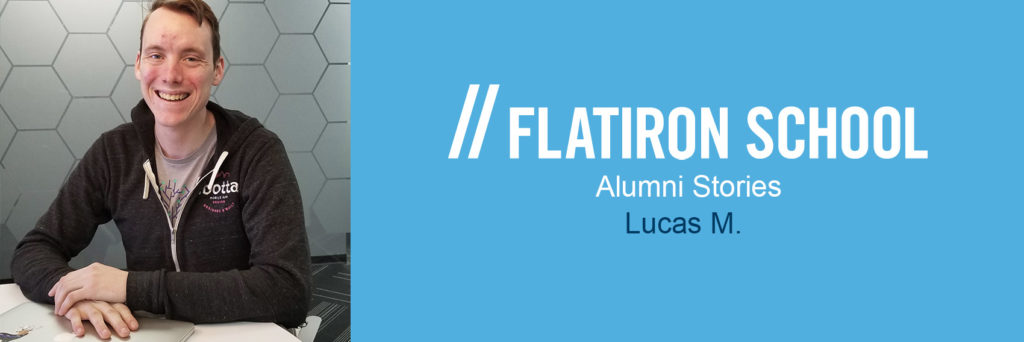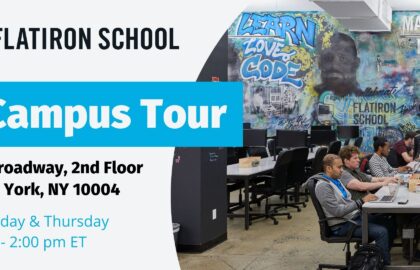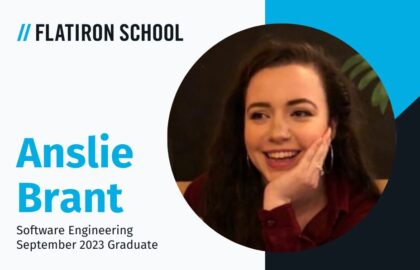At Flatiron School, our success is our students’ success — when students get jobs, we achieve our mission of enabling the pursuit of a better life through education. But, students’ stories don’t end after they graduate. In this series, we chat with Flatiron School’s alumni community about their journey into coding, and how that journey transformed their life.

Lucas M. was working as a bilingual elementary school teacher in the border town of McAllen, Texas. He enrolled in Teach for America after graduating from college where he studied journalism and Spanish. Lucas first taught third grade and then fifth grade. But, he wasn’t satisfied and realized he was not on his career path.To get back on track, Lucas looked back to a high school and college hobby. He built websites in his spare time and realized this was something he could do as a career. He had already taught himself HTML, CSS, and JavaScript. The next step would be to get some formal training, which is when he turned to Flatiron School. Having graduated from Flatiron School's Online Software Engineering Bootcamp, Lucas is now a Platform Engineer at Ibotta.
Below, Lucas discusses how he made the leap from teaching to software engineering. If you’re passionate about something, it can be more than just a hobby. In fact, it could be the career you’ve been looking for.
A grade-school teacher in Texas
Lucas studied journalism and Spanish in college. He enrolled in Teach for America after graduating and became an elementary school teacher. He moved to McAllen, on the border of Texas and Mexico. “I was a bilingual elementary school teacher for two years. I taught third grade and then I taught fifth grade,” Lucas said. He liked teaching, and he liked the children, but soon realized he didn’t want to continue as a teacher. “After I left teaching, I had some time to kind of figure out what it is I really wanted to do,” Lucas said. Lucas drew inspiration from a favorite hobby. “I thought back to in college and in high school – the thing that I did as a hobby was build websites,” he said. “And that was the sort of thing that I could do forever. It just really fed my creative mind.” He also recalled how he used to create custom iPod templates for his friends. A problem solver and builder at heart, Lucas spent more time thinking about becoming a developer. Free tutorials and self-taught options, while adequate, were not enough if he wanted a career as a software engineer. That’s why Lucas’ path eventually led to Flatiron School.
Key takeaway → Every job may not lead to a career. But, it can give you incredible experience that you can use in the future. Find your passion, build your skills, and never stop learning.
A world of inspiration
Drawing on past experiences is important when you’re trying to figure out what’s next. Sometimes, it can be used as a guide forward. Other times, it can be used to figure out what not to do. While Lucas studied journalism and marketing in college, he didn’t want to go that route. He wanted a career that was more practical and he found inspiration as he was traveling the world.“It didn't matter if you were in Bolivia or Peru — if you had a skill you could make it happen,” he said. Those tangible skills could help lead to a new career and that’s why Lucas committed to gaining the skills he needed to become a developer. A programmer builds products and understands how the digital world works. “That's what I like about programming. The tinkering with all that stuff and making it work,” Lucas said.Lucas saw programming as a way to satisfy his creativity and his problem-solving instincts. “I know I will never know it all in this career,” Lucas said. “There are so many specific, and very deep, niches to programming.” Lucas describes learning to code like going down “the rabbit hole” where you can dive deeper and deeper into a specific language or framework.
Key takeaway → Draw inspiration from everything around you. Your past experiences, travels, hobbies, joys, and disappointments shape who you are and what your future can be.
The Flatiron School experience
There were two reasons that Flatiron School stood out to Lucas. First, was the money back guarantee (see details). “They were the only one that had an independent third-party audit of their job placement rate,” Lucas said. “That made it a no brainer.”Even though Lucas enrolled in the Online Software Engineering Bootcamp, he never felt alone. The online program, at the time Lucas was enrolled, let you choose your own pace and a schedule that best fits your needs. Lucas was in Peru when he enrolled and was hooked instantly. “It was before I even enrolled actually. It was the Bootcamp prep,” Lucas recalls. “We were building a command line interface to play tic-tac-toe. And, I was just geeking out about it.”That excitement continued into the bootcamp and the curriculum itself. “There were times where I was frustrated and I was stuck,” Lucas said. “But, I always had support to be able to get the help that I needed.” Facing a challenge can be the most important learning opportunity, according to Lucas. A problem gives you a chance to look at the bigger picture and think your way through to a solution. “When I broke something in a big way, I thought, ‘Oh no what did I do?’ And I had to back engineer a little bit and then learn the larger context, zoom out, and see what I did wrong,” Lucas said. As Lucas was nearing graduation, he was paired with a coach from Career Services. The coach’s role was to support Lucas throughout the job hunt and prepare him for a career he wanted. “Career services functioned as a strong structure to do all of the things necessary to make me the most appealing candidate for a job,” Lucas said. He would go to Meetups, learn more about the community, and eat a lot of pizza while applying to jobs. In the end, his efforts paid off and he is now a Platform Engineer at Ibotta.
Key takeaway → A good bootcamp prepares you for your job hunt and your career. But, you still need to take ownership of those steps in order to succeed.
Life as an engineer
Even though Lucas is now a Platform Engineer, he still uses many skills he learned as a teacher in his new role. His communication skills have actually set him apart from his colleagues. “There are a ton of opportunities to teach new people who are starting at the company or to write documentation of how this specific thing that I built works,” Lucas said.Lucas can also draw from his experience as a teacher and at Flatiron School to train himself and others. He can build a curriculum to learn Java Microservices, for example, even though it’s not something he learned at Flatiron School.He also uses his own experience and background as something of an outsider—a developer without a computer science degree — to stake his claim at Ibotta. Lucas convinced the company to hire him with clever outside-the-box thinking by contributing to their open source code before working there. He has also worked on documentation for junior engineers and the general onboarding process to identify and train new talent. His education has helped him get to where he is today and Lucas feels prepared for his role. He’s learned many new skills since being hired and is always interested in learning something new. He says he now has a stable work-life balance that lets him leave at 5 p.m. and he can work remotely when necessary. Lucas’ advice for potential bootcamp students is to work on projects and to stand out from the crowd. Show that you’re passionate about coding, breaking things, and be willing to learn.




